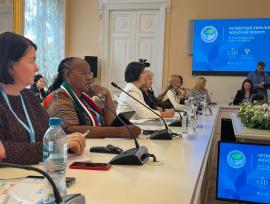
Department of Women, Youth and Persons with Disabilities Director-General, Advocate Mikateko Maluleke, says gender equality is contingent on women's economic development and financial independence.
“Worldwide, history and research has demonstrated that women’s economic empowerment increases their access to economic resources and opportunities including jobs, financial services, property and other productive assets, skills development and market information,” Maluleke said.
She highlighted that for South Africa, this outlook has translated itself in vast areas of development where women are taking the reins and actively contributing to their country’s development agenda.
“South Africa’s economic empowerment mechanisms for promoting the status of women, fully utilising government resources and effectively mobilising social resources lays an important foundation in the promotion of gender equality and women’s development,” Maluleke said.
The DG was speaking on Thursday at the Women for Social Progression session held during the BRICS Women’s Forum currently underway in St. Petersburg, Russia.
The Eurasian Women’s Forum is an influential international platform that enables women leaders from all continents to engage in dialogue and adopt joint decisions on key issues concerning international cooperation, sustainable economic development, the assimilation of new technologies, a healthy lifestyle, environmental safety, and the promotion of social charitable projects.
Maluleke pointed out that shared commitment across all sectors to support, grow, empower, and recognise women leaders not only promotes fairness, but it also improves the performance of state companies and organisations.
She said empowered, inspired, and developed women are critical to improving any country’s global competitiveness and “this is equally the legacy that will be passed over to future generations”.
“Gender equality and empowered women are catalysts for multiplying development efforts and positively positioning the competitiveness of countries as an attractive investment destination.
“Women are architects of society and are revered for their strength in building the family unit and homes, as well as their contributions to the communities, societies and nations,” Maluleke said. She emphasised the importance of integrating digital technologies into all areas of business, changing how economic and social activities are conducted.
While digital technology can bring tremendous opportunities, Maluleke acknowledged that it can also widen socioeconomic gaps for those who lack internet connectivity, affordable devices, or the skills to benefit from digital services.
She said vulnerable people and groups who do not have training in digital skills are equally more susceptible to online risks including fraud, data disclosure, identify theft and cyberbullying.
Maluleke also noted that while the digitalisation of social protection presents immense opportunities for delivering welfare services more efficiently and effectively, it also raises critical challenges related to data protection, data poverty, and bias and discrimination.
“Protecting sensitive data, ensuring privacy through consent, and minimising surveillance risks are crucial for maintaining trust and upholding individual rights. Addressing the digital divide and providing alternative methods for inclusion will ensure that vulnerable groups are not left behind in the transition to digital systems,” the Director-General said. – SAnews.gov.za


